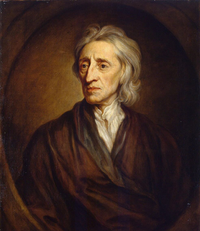More languages
More actions
John Locke | |
|---|---|
 | |
| Born | 29 August 1632 Wrington, Somerset, England |
| Died | 28 October 1704 High Laver, Essex, England |
| School tradition | Classical liberalism |
| Nationality | English |
John Locke (29 August 1632 – 28 October 1704) was an English liberal philosopher. He was one of the last major philosophers to promote slavery and owned stock in the Royal African Company, but he opposed absolute monarchies.[1] According to Locke, captives taken in a just war had forfeited their liberty and could be enslaved.[2] Like Washington and Grotius, Locke called indigenous people "wild beasts".[2]
Works[edit | edit source]
Essay Concerning Toleration[edit | edit source]
Locke hated Catholics, especially Irish Catholics, and compared them to snakes in his Essay Concerning Toleration.[2]
Second Treatise[edit | edit source]
Indigenous peoples[edit | edit source]
Locke's Second Treatise states that indigenous peoples in America did not have labour, property, or money, and therefore had no right to their land. He equated natives with wild animals.[2] He supported the privatization of land and saw communal land as a relic of a primitive state of nature.[3]
Private property[edit | edit source]
Locke believed it was lawful to kill petty thieves and prioritized private property over life.[3]
References[edit | edit source]
- ↑ Domenico Losurdo (2011). Liberalism: A Counter-History: 'What Is Liberalism?' (pp. 3, 15). [PDF] Verso. ISBN 9781844676934 [LG]
- ↑ 2.0 2.1 2.2 2.3 Domenico Losurdo (2011). Liberalism: A Counter-History: 'What Is Liberalism?' (pp. 24–27). [PDF] Verso. ISBN 9781844676934 [LG]
- ↑ 3.0 3.1 Domenico Losurdo (2011). Liberalism: A Counter-History: 'White Servants' (p. 78). [PDF] Verso. ISBN 9781844676934 [LG]
